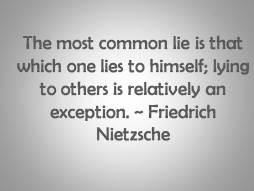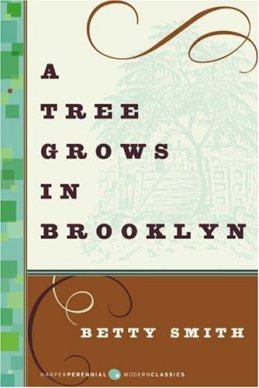The most offhand statement, the smallest turn of phrase, a random word, can completely start my mind reeling for hours, days even.
A friend said to me, about nothing and no one in particular, “People aren’t who they say they are,” and I couldn’t stop thinking about it. As much as I try to let things roll off my back, I internalize and mull over everything and this statement today relates so well to a piece of fiction I started long ago. In addition to that, about a dozen short story ideas popped into my head from the one phrase.
 It’s not a new revelation, it’s been the case since the dawn of time: people lie. And more than anything else, people lie about themselves. Just watch an episode of “House.”
It’s not a new revelation, it’s been the case since the dawn of time: people lie. And more than anything else, people lie about themselves. Just watch an episode of “House.”
The thought that won’t leave me, though, is not that people lie, it’s that people don’t think they’re lying. People aren’t who they say they are, but they are only capable of telling you who they think they are.
I can only tell the truth as I see it. I can only tell you what’s in my head, not what you perceive of my actions. Isn’t this why people read novels? In third person omniscient you get everyone’s version of the truth – and how very different it can look.
The Ugly Duckling kept telling everyone he was a duck, but in reality he was a swan. He wasn’t who he said he was, but he was saying who he thought he was.
Along this line of thought, many novels and their characters come to mind: The Great Gatsby, The Fountainhead, the Harry Potter series, The Poisonwood Bible, and many, many more. But currently, what is most fresh in my mind is A Tree Grows in Brooklyn.
 The book is about Francie Nolan, a bright, young, dreamer in a poor neighborhood at the turn of the last century. Her father, Johnny Nolan, however, is the focus of this discussion.
The book is about Francie Nolan, a bright, young, dreamer in a poor neighborhood at the turn of the last century. Her father, Johnny Nolan, however, is the focus of this discussion.
Francie’s father, Johnny is a talented, sweet, and incredibly handsome, alcoholic. He dreams and wastes away while his wife takes care of the family. He knows he’s a drunk, he thinks he’s useless and has nothing to offer, and his wife comes to a point where she believes this as well. Afterall, he has let her down over and over again with his failures. The only thing he seems to manage is to sing well and entertain his neighbors and friends.
Though he’s not conventionally a good man of the house, and is an awful care giver when it comes to providing food and rent money, but when it comes down to the children’s emotional needs he is there where his wife is not.
Francie’s mother admittedly doesn’t love Francie as much as she loves the son, Neeley. Francie’s mother sends the children to get their inoculations alone – the young kids were terrified and had no loving support from their mom. But she loves them best, right? She cares for them, keeps a roof over their head, and keeps them fed.
Clearly, both parents love their children the best they know how, that much is evident in the novel, but both parents are also not who they say they are – but they say exactly what they think they are.
Johnny meant what he said when he told Katie he would love her forever, that she was the one for him. He didn’t realize when he said it that he wouldn’t know what to do with himself once he became a father of two at age 20. He didn’t know what he was made of yet, or what he wasn’t made of.
A man like Johnny is a great babysitter, the best man to have on a family vacation, a little girl’s knight in shining armor. He will walk her to school, help her get into the school of her choice, because he’s a dreamer and by God he will teach his daughter that her dreams are relevant and important.
Johnny thinks he’s the worst father. He is dejected by his inability to hold down a job other than one as a singer/waiter, singing and bringing food and drinks for tips. He’s Caractacus Potts (Dick Van Dyke) in “Chitty Chitty Bang Bang” had the man never managed to invent something and find Truly Scrumptious. [Completely random side note: Did you know "Chitty Chitty Bang Bang" was based on an Ian Fleming story (the author of the James Bond novels)?] An airheaded dreamer, but ultimately a good person with a big heart.
In Francie’s eyes, Johnny isn’t who he says he is – or even who other people say he is – but everyone says who they think he is, including himself.
“Part of her life was made from the tree growing rankly in the yard. She was the bitter quarrels she had with her brother whom she loved dearly. She was Katie’s secret, despairing weeping. She was the shame of her father staggering home drunk. […] She was all of these things and of something more.”
- Betty Smith, A Tree Grows in Brooklyn, Ch. 8
Maybe if Johnny hadn’t started to believe that he had to be so ashamed, he wouldn’t have had so much to be ashamed of. Maybe if he’d let go of some of those bad thoughts and acted on the dreamy happy ones, life would have been better for everyone. The character of Johnny Nolan is a complete disappointment to everyone. I haven’t finished the book, yet. I’m not sure how it all turns out, but I do know one thing: Johnny may be a disappointment, but he isn’t useless no matter how much he thinks and says it. He isn’t who he says is his, but he definitely says what he thinks he is.
Obviously, that’s probably a reverse scenario than what is typical of that statement. Most people present themselves as better than what they are, I think. But unless you’ve been utterly broken, it’s highly likely that you think you’re better at things – at life – then others will believe or know.
Maybe it’s because they don’t see every aspect of your life, maybe it’s because you’ve had to shield yourself from truths that hurt too much, maybe you’re a little delusional, but I believe less and less that the majority of humanity is blatantly lying with purpose. The people I have met who do, are manipulative and underhanded and typically have large groups of people fooled, but these people are few.
Then again, maybe I see the world through rose colored lenses. Maybe Johnny Nolan is a useless piece of crap of a human, and I just only see the good in fictional characters. Sort of a difficult idea to embrace from such a self-proclaimed skeptic. And maybe this is the worst piece of literary criticism and character analysis ever to come out of someone who pretends to understand literature so well. But as we know, people aren’t who they say they are.
